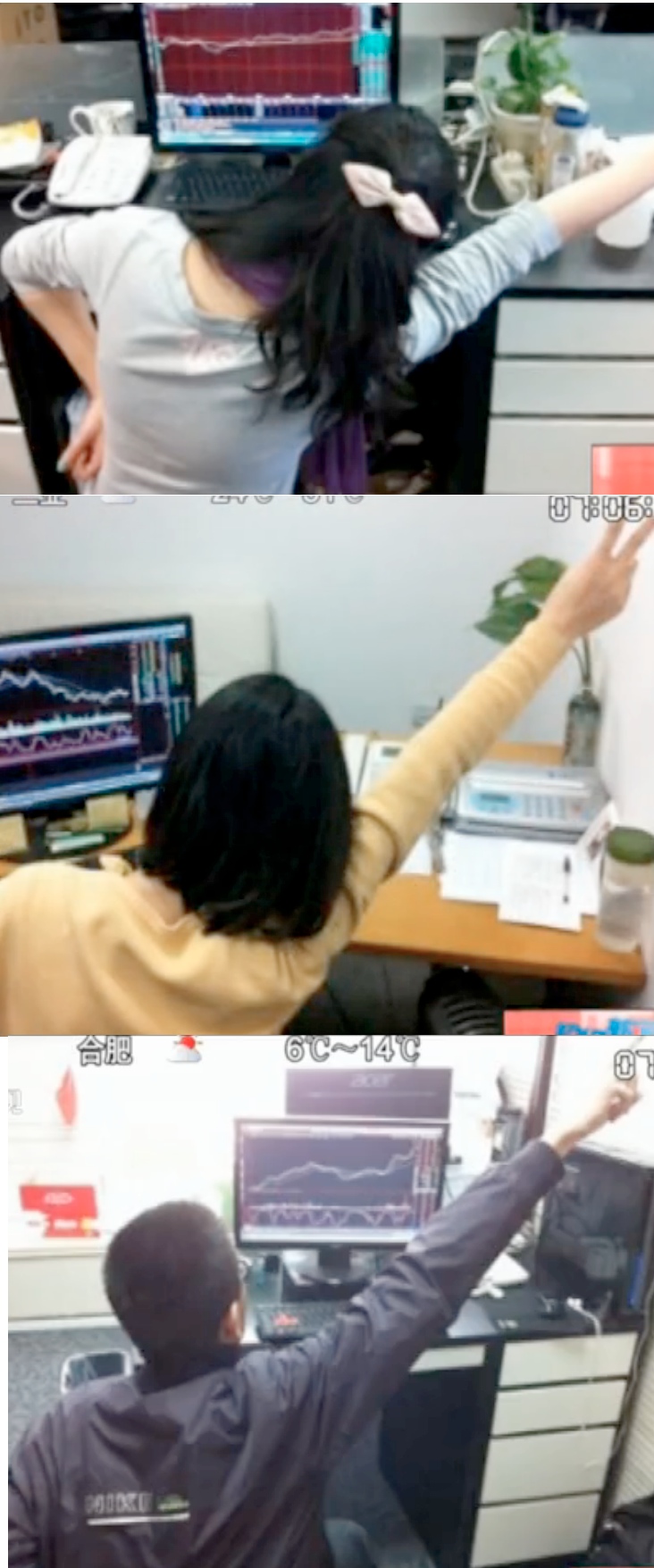The Shanghai Stock Exchange composite index fell below 2,000 points on November 27, 2012, the lowest since 2009. According to a poll, 92% shareholders have lost money [1] [zh] in their investment. A recent survey in Sina [2] showed that more than 25% suffered from 50-80% loss and 24.2% suffered from 30-50% loss. Within 7 months, Shanghai and Shenzhen Stock Market has vaporized RMB 4300 billions (approximately USD 700 billions), only 3.35% shareholder accounts are still active in the exchange market. On average each shareholder has lost RMB 76,800 yuan (USD 12,000).
As China's economy has been growing, its stock keeps sinking [3]. Why is that so? Many shareholders blame corruption. Below are some discussions in China's micro-blog [zh]:
 [4]
[4]Chinese shareholders posed in front of the stock market curve to express their wish for a more healthy market. Screen capture from Anhui Star TV.
鼎鏊肖志军:这十年,我国的GDP与股市行情成反比,股市越跌越惨,股民损失惨重,国家收入虽然逐年增加了,而广大股民却血本无归,民生艰难,还有什么值得炫耀的呢?
Xiao Zhijun [5]: In the past ten years, the stock market and our country's GDP have been moving in opposite directions. The stock market keeps sinking and shareholders are desperate. The country's income has grown, the shareholders have lost their investment. People's livelihood is difficult, there is nothing to be proud of.
Corruption and fraud in the market
2012很疯狂:这是一个极少数人利用规则掠夺绝大多数人的地方,其黑暗,堕落之程度比之反腐前的中国足坛有过之而无不及
2012 is very crazy [6]: This is a place where the extreme minority of people rob the majority by making use of regulations. The corruption and decadence is much worse that the China football sector before reform.
Nanimina:中国股市不是投资市场是投机市场,某种意义上讲和花十几万买一注彩票一般,大骗子裹着一小撮二,三级骗子骗光中国股民的钱。觉悟吧!
Nanimina [7]: The China stock market is not investment market but gambling market. It is like putting thousands of dollars onto the gamble table. The big fraud works with a bunch of deceivers cheating the Chinese shareholders’ money. Wake up!
pavage:包装上市,控制流通,高价发行,骗取钱财,造就亿万富翁;年复一年,编故事,造报表,骗取财政补贴;增发扩股,再融资,二次骗取股民钱财;不分红,、少分红,挨过三年,迅速套现。移民国外,丢下破烂企业。如此拙劣一套,外行人也看清,为何这10年不查,不惩,不改?利益共享,悬弄百性也!!!
savage [8]: They repackage the corporation for the market, control the flow and push up their listing price to steal money and create new billionaires. One year after another, they fabricate stories and account details, cheat government's subsidies. Then they issue more shares and extract money from the market, cheat the shareholders again. They do not share profits by giving out dividends. After a few years, they cash out their shares and migrate out of the country, leaving the corporation behind. Even outsiders see such tricks, but nothing has been done to stop this. There is embedded interest in the fraud while ordinary people are doomed to be cheated.
老徐时评:沪深股市今天又创新低了。按理说股市是市场行为,赚了亏了和政府没什么关系。可是我要问了:是谁在党的政治报告中忽悠要增加人民的财产性收入?是谁要求股民们坚持价值投资?是谁鼓吹对中国的上市公司要有信心?中国的股民是全世界最好的股民,痴心不改矢志不移,最后落得连裤衩都输光了,责任在谁?
Lao Xu [9]: The Shanghai and Shenzhen Stock market sinks to the lowest today. Common sense tells us that the stock market reflects the market and we should not blame the government for its behavior. But I have to ask: Who gave the instruction in the party [Chinese Communist Party] political report that the proportion of people's property income should grow? Who persuaded shareholders to stick to value investment? Who told people to have confidence in the listed companies? Chinese shareholders are the most innocent kind, they follow the advice and now have lost their underpants. Who should be responsible for their misery?
自成一段:1.3亿股民基本都受到股市严重的掠夺和损害,我敢肯定,他们从股市看到了中国的黑暗和腐败,他们对你们的看法和感受是不言而喻的,不管你们说的多么动人。
A single paragraph [10]: The stock market has robbed and harmed 130 million shareholders. I am quite sure that they have experienced Chinese corruption through the stock market. No matter how flowery your speech is, they will judge by their own experience.
Calls for finance regulation reform
Although more than 60% of shareholders hope that the government can intervene and save the market, many professional commentators think otherwise. For example economist Hua Sheng believes [11] [zh] the only solution to the current situation is finance regulation reform:
华生2010:参加财经年会记者问股市,我说任何市场下跌都是因为供求失衡,供大于求。改革就是最大的救市。大幅提高上市门槛,驱散前门排队的饿狼;调高后门退出的门槛,限制现股价远低于发行价包装上市的原始股东和高管套现离市,并追究相关保荐机构责任吊销几家执照,若此,今天宣布改革启动,股市明天就止跌回升
Some reporters asked me about the stock market at the annual finance conference. I explained that the main reason for the sinking stock market is that the current supply is much bigger than the demand. Hence, reform is the best measure to save the market. [The China Securities Regulatory Commission] should impose stricter requirements for corporate entry to the market so as to kick the wolves out of the queue. At the same time, impose restrictions for major shareholders cashing out their stock when the stock price is much lower than the initial listed price. [The authority] should also investigate fraud, make sure that the sponsor institution which gave recommendations and guarantees to the listed corporation have liability for the fraud. If such reform is put into practice, the stock market will stop sinking and rise again.